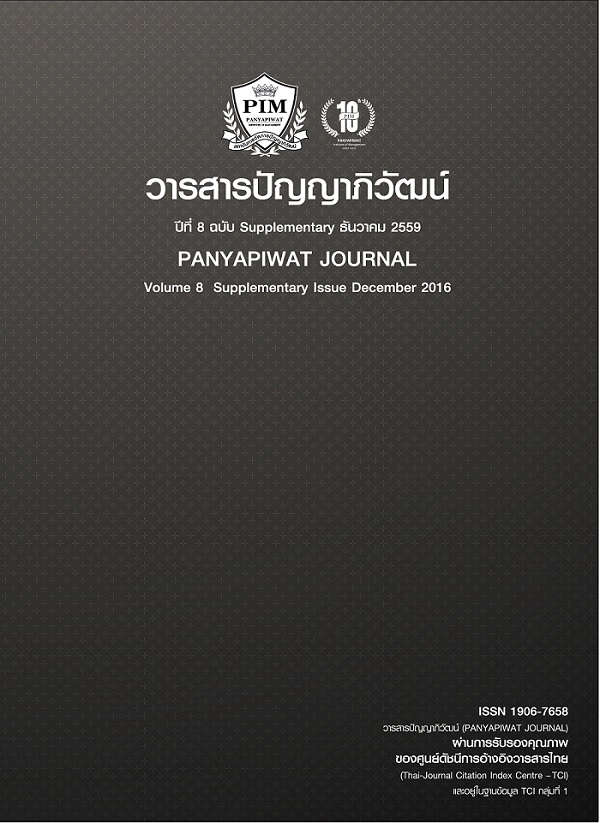人格生态特质与山地旅游消费决策行为的 关系:一个理论分析的思路与框架
Main Article Content
บทคัดย่อ
本文采用文献分析的研究方法,梳理人格理论、人格特质理论、山地旅游消费决策行为理论,提出人格生态特质理论,并探讨人格特质、山地旅游与旅游消费决策行为之间的关系。认为人格生态特质是一个整体性概念,生态原型是其核心内容,人格生态特质制约着个体的行为,影响着个体对自然环境的态度和行为。故山地旅游消费决策行为受到人格生态特质的影响。
This paper adopted documents research based on the theory of personality traits, mountain tourism and consumer behavior theory, to put forward the ecological personality trait theory, and to explore the relationship between personality traits, mountain tourism and tourism consumption decision behavior. Personality traits is a holistic concept, and its core content is the ecological prototype. The decision behavior of mountain tourism consumption is influenced by the character of personality.
Article Details
“ข้าพเจ้าและผู้เขียนร่วม (ถ้ามี) ขอรับรองว่า บทความที่เสนอมานี้ยังไม่เคยได้รับการตีพิมพ์และไม่ได้อยู่ระหว่างกระบวนการพิจารณาลงตีพิมพ์ในวารสารหรือแหล่งเผยแพร่อื่นใด ข้าพเจ้าและผู้เขียนร่วมยอมรับหลักเกณฑ์การพิจารณาต้นฉบับ ทั้งยินยอมให้กองบรรณาธิการมีสิทธิ์พิจารณาและตรวจแก้ต้นฉบับได้ตามที่เห็นสมควร พร้อมนี้ขอมอบลิขสิทธิ์บทความที่ได้รับการตีพิมพ์ให้แก่สถาบันการจัดการปัญญาภิวัฒน์หากมีการฟ้องร้องเรื่องการละเมิดลิขสิทธิ์เกี่ยวกับภาพ กราฟ ข้อความส่วนใดส่วนหนึ่งและ/หรือข้อคิดเห็นที่ปรากฏในบทความข้าพเจ้าและผู้เขียนร่วมยินยอมรับผิดชอบแต่เพียงฝ่ายเดียว”
เอกสารอ้างอิง
Bai, K., Yan, Y. & Gao, Y. l. (2011). The Research on the Impact of Personality Traits of “after 80s” to there Tourism Preferences. Journal of Beijing International Studies University, 33(1), 68-75. [in Chinese]
Beerli, A. & Martín, J. D. (2004). Factors influencing destination image. Annals of Tourism Research, 31(3), 657-681.
Chen, J. C. & Bao, J. G. (1988). A Study of Tourist Behavior and Its Practical Significance. Geographical research, (3), 44-51. [in Chinese]
Chen, J. W. & Wang, T. (2003). Basic Trends of Contemporary Personality Research. Journal of Xiamen University (Arts & Social Sciences), (3), 64-69. [in Chinese]
Chen, Q. Z. (2013). Ecological Personality: the perfect path of the system of ecological civilization. Guangxi Social Sciences, (11), 78-82. [in Chinese]
Chen, S. H. (2004). Personality psychology. Guangzhou: Jinan University press. [in Chinese]
Chen, X. (2013). Strategic thinking on the sustainable development of mountain tourism in the west of china. Journal of Southwest University for Nationalities (Arts & Social Sciences), 34(2), 153-155. [in Chinese]
Costa, P. T. & McCrae, R. R. (1992). Four ways five factors are basic. Personality and Individual Differences, 13, 653-665.
Costa, P. T. & Mccrea, R. B. (1989). Revised NEO Personality Inventory (NEO PI-R) and NEO Five-Factor Inventory (NEO-FFI). Lutz: Psychological Assessment Resources.
Fraen, K. E. (2006). Civilization: Utopia and tragedy. The international culture publishing company. [in Chinese]Goldberg, L. R. & Saucier, G. (1995). So what do you propose we use instead? a reply to block. Psychological Bulletin, 117(2), 226-229.
Gössling, S. (1999). Ecotourism: a means to safeguard biodiversity and ecosystem functions?. Ecological Economics, 29(2), 303-320.
Guo, Y. Y. (2005). Personality psychology. Beijing: Chinese Social Science Press. [in Chinese]
Hao, G. Z. (1985). Tourism resources in mountainous areas of china. Mountain science, 9(2), 40-51. [in Chinese]
He, J. B. & Guo, Y. Y. (2005). Review the Research of Physiological Base of Personality. Psychological exploration, 25(3), 59-63. [in Chinese]
He, Y., Ma, Y. F. & Sun, G. N. (2006). Tourist information-search mode study of British travelers on Different Purposes’ in China. Journal of Northwestern University (Natural Science Edition),36(2), 330-334. [in Chinese]
Hol, E. (1987). Outline of Carl Jung’s psychology. The Yellow River: literature and Art Publishing house. [in Chinese]
Huang, S. M. (2002). A model of interpretation: Holzer model. News University, (4), 15-19. [in Chinese]
Huang, X. T. (2002). Personality psychology. Zhejiang education press. [in Chinese]
Kang, J. Q. & Tian, B. (2008). The effect of personality on College Students’ tourism preference. Journal of Hebei Tourism Vocational College, (3), 55-60. [in Chinese]
Liu, T. H. (2009). The traditional theory of five types of personality and the hyper stable men tality structure in China. Journal of Shanghai Normal University (Philosophy & Social Science Edition), 38(3), 103-113. [in Chinese]
Lu, L. (1997). A study on motivations of tourists in mountain resorts—A case study of tourists in Huangshan Mountain. Human Geography, (1), 10-14. [in Chinese]
Norman, W. T. (1963). Toward an adequate taxonomy of personality attributes: replicated factor structure in peer nomination personality ratings. Journal of Abnormal & Social Psychology, 66(6), 574-583.
Po, W. (2001). Personality science. Shanghai: East China Normal University press. [in Chinese]
Qiu, F. D. (1996). Tourism motivation and its influencing factors. Psychological Science, (6), 367-369. [in Chinese]
Rong, G. (1989). Man and His Symbol. China International Broadcasting Publishing House. [in Chinese]
Rong, G. (2011). Prototype and collective unconscious. The international culture publishing company. [in Chinese]
Saggino, A. (2000). The big three or the big five? a replication study. Personality & Individual Differences, 28(5), 879-886.
Schill, T., Beyler, J. & Sharp, M. (1993). Pleasure from activities and self-defeating personality. Psychological Reports, 72(2), 627-630.
Schutte, N. S., Malouff, J. M., Thorsteinsson, E. B., Bhullar, N. & Rooke, S. E. (2007). A meta-analytic investigation of the relationship between emotional intelligence and health. Personality & Individual Differences, 42(6), 921-933.
Tooman, L. A. (1997). Applications of the life-cycle model in tourism. Annals of Tourism Research, 24(1), 214-234.
Wang, G. X. (2011). Ecological consciousness, ecological consciousness and ecological consumption. Journal of Beijing Forestry University: Social Science Edition, 10(1), 50-53. [in Chinese]
Wen, Y. & Liu, X. (2009). Study on Community Participation- based Mountainous Region Tourism of Sichuan. Finance and Economics Science, (2), 110-115. [in Chinese]
Wiggins, J. S. & Trapnell, P. D. (1997). Personality structure: The return of the big five. In Handbook of Personality Psychology. San Diego, US: Academic Press.
Xu, Y. (2003). The Developmental Trend of Modern Personality Psychology. Psychological exploration, 23(3), 15-19. [in Chinese]
Yang, F. Y. (2005). An analysis of the establishment of the network of ecological tourism cooperative in the mountainous area of Southwest china. Ecological economy, (3), 104-106. [in Chinese]
Yue, Z. F. (1987). Tourism motivation research and decision making of tourism development. Tourism Tribune, (3), 32-36. [in Chinese]
Zhang, W. H. (1999). Quantitative analysis of tourism motivation and its countermeasures. Journal of ShanXi Finance and Economics Universit, (4), 100-103. [in Chinese]


